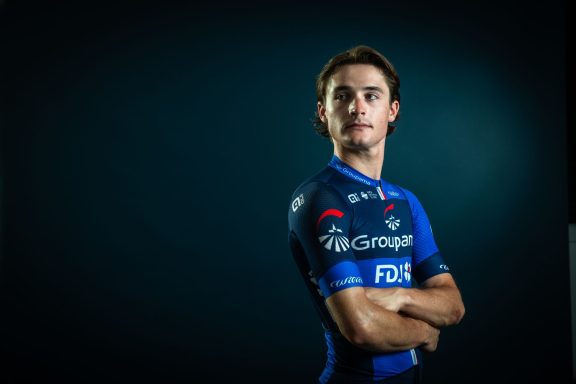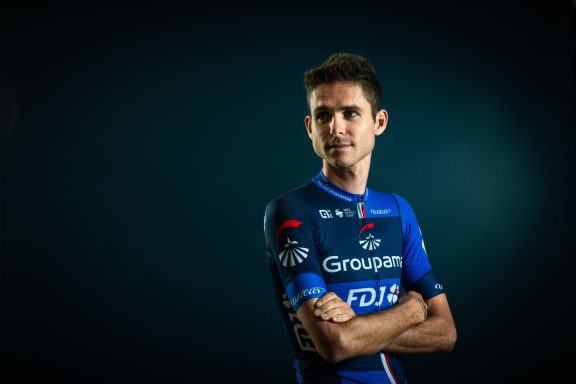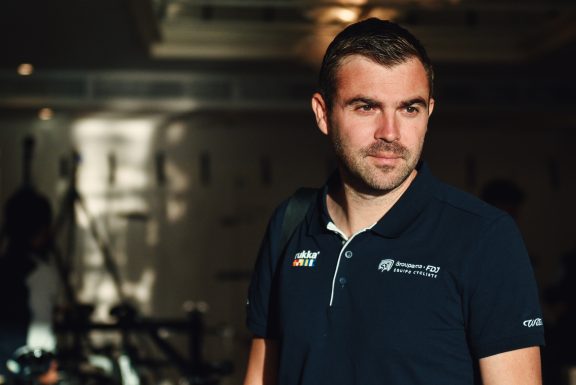Three years later, Marc Sarreau is back home. After having experienced a difficult time and considered quitting the sport, the 30-year-old Frenchman wants to give new momentum to his career within the Groupama-FDJ cycling team. He joined the team over the winter as a lead-out man for Paul Penhoët and will take on this role as soon as the young sprinter is back from injury. In the meantime, he’ll get some opportunities, like in Valencia last weekend (7th). We sat down with him.
Marc, what did you feel putting on the team jersey again in competition last weekend?
It was really nice, and also a big change. The sports directors were new, as were the riders. I had the same jersey as when I left, and not really actually because it also changed (smiles), but with no one who was there at the time. Still, I was very happy to ride with the team again, and even with all these new people, the motivation and belief were similar to what I knew, which suits me well.
“It would have bothered me to stop so young”
Your last race with the team was that infamous stage of the Tour of Poland. Can you sum up what has happened since then?
It was a bit of a difficult time, a roller coaster ride you might say. I started my adventure with AG2R-Citroën with an injury, then there were three seasons with knee problems, issues after crashes, an iliac artery surgery. It was a mix of big blocks of training to get back to a good level and periods of poor form due to injuries and illnesses. It was definitely not what I expected when I left. I clearly didn’t maximize those years. It wasn’t meant to be my best period on the bike, but I think I still have one or two seasons left to reach my best level. I still feel quite fresh. I think that I have not reached my physical maturity, that I can still progress and that my return to the team will help me in that. In one or two years, we’ll take stock and judge whether I did miss my best years or whether I managed to do some even better ones.
Do you feel bitter about this sequence?
I’m really not frustrated. At the time, leaving the team was the right choice. I had to do it to have more ambition, to keep growing, to step out of Arnaud’s shadow a little and to seize my chance. It was my best opportunity at the time, so I took it. I really don’t regret it. Then, it didn’t go as I would have hoped, but a sporting career is never straightforward. Then, even if it didn’t bring me any results or significant progress, I also learned about myself in this time of struggle. Everything is obviously easier when you win races often, but I don’t regret those years at all, and it will be useful to me later. It didn’t work, my former team certainly made some mistakes too, but it was an experience, and it now belongs to the past.
How did you experience the 2023 season, and more particularly the end of it?
I started it motivated as always, with the aim of having the best possible season in order to find a challenge and a team that trusts me for the following year. It was long to come, with some other injuries and poor results. Summer approached, I had some contacts, but nothing concrete. I quickly realized that it was going to be hard to find something that suited me, and a team that was happy to welcome me. I also didn’t want it to happen by default, so I started to think about what to do next, and the conditions I would accept to continue cycling or not. I had a few projects in mind, quite precise, and they just needed to be put in place once the end of my career would be confirmed. I still focused on the end of the season so as not to regret anything and to be sure I could seize the opportunity if it came. Yet, the more the season progressed, the more I told myself that it was certainly the last one. I really didn’t feel any nostalgia. It would have just bothered me to stop so young, and without having gone to the end of it, because I still felt physically fresh. I didn’t have a deadline in mind, but after the last race, I thought that there was a greater chance that it was over than the opposite. Then, just after Paris-Bourges, I received a phone call which told me that Groupama-FDJ was interested. I just had to take some tests to make sure the knee and everything else was ok. I didn’t think for very long, I went to take these tests right away and it was conclusive.
“I thought I would be more valuable alongside a young guy”
What were your conditions to continue in pro cycling?
It wasn’t necessarily about the level of the team. I was ready to sprint, but not just for the sake of it, in a team that didn’t really care. My strongest wish was to lead out someone faster than me or a young guy to share my experience and to aim for top victories, namely in the WorldTour. I thought I could contribute in this way. So what Groupama-FDJ proposed to me was a perfect fit. I was also ready to accept a domestique role, but there was the salary question. I was not ready to take a 2k/month pay in a Continental team just to continue one or two years in cycling and sacrifice a lot of time with my family. I would have rather entered the “normal life” earlier, even if it meant earning a little less money than in cycling, but being able to enjoy my family.
So you had the idea of becoming a lead-out man even before the team’s offer?
I had even spoken to my agent about it the previous season, before extending for a year with AG2R-Citroën. What keeps me moving forward in sport is constantly aiming for progression and higher and higher goals. When I left Groupama-FDJ, I had reached the level to win Class 1 or Pro Series races. My goal was to do it in the WorldTour. However, during these three difficult years, I stagnated or even regressed. I won a few races, but I felt less strong, and I didn’t reach WorldTour level in the sprints. For me, a cycle pretty much closed at that point, because I had been trying for ten years. I might not be far from my physical maturity, but my wish is to continue to aim high. I thought I would be more valuable alongside a young guy or someone faster, rather than being stubborn and wanting to get this victory at all costs.
Would you define it as clear-headedness?
I think there is a bit of clear-headedness, but that is also part of my character. I’m a sprinter, of course, but I am never the last one to protect my colleagues and ride in the wind. I like that role. In the youth categories or as an amateur, I have never had a leadership role over a full year. The professional world naturally put me into this position, and it’s not necessarily what I like the most. I’m not really someone who leads or shouts. I’m rather discreet. So naturally, as this cycle came to an end, returning to a domestique role seemed suited to my mentality. It made sense to me, unlike some sprinters who have been doing this since they were young and don’t see themselves becoming domestique at all.
“The team knew who they were signing”
Did you know the needs of the team, which matched with your own project?
There were discussions before the summer. They asked me if I could accept this role and give up being a sprinter. It didn’t go further, but I knew the team wanted to strengthen the train around Paul. I also learned of the signing of Cyril Barthe later on. I thought that this role had been granted to him and that they were not really looking for another rider of this kind. Only towards the very end, my agent was informed that there was possibly a place for an additional lead-out man. The team knew that I had no other concrete offers. They knew my qualities, my faults and knew who they were signing. From the moment they decided internally that it was possible, all it took was a phone call to pass the tests and confirm the signing.
To lead someone out is also not completely new to you…
It’s true that I had the opportunity to do it a little bit with Arnaud and his train at the time, before Jacopo and Ramon arrived. When I was a trainee, I had a taste of it, I saw how it worked. Then in 2016, when Mickäel Delage crashed in Hamburg, Arnaud found himself without a lead-out man. I took on this position for him at the end of the season and he actually took me with him to the world championship. It worked quite well, and I really liked it, even though I was new to the role and probably lacked maturity and power. We can say that today is a return in order to perfect it.
Is the mental and physical approach to this role very different?
Definitely. Mentally, it’s quite difficult to explain. When you are a sprinter, the pressure of the result is on your shoulders. The lead-out man can take some pressure off the sprinter from this point of view, to lead the team. He can also act as road captain so that the sprinter can really focus on his effort, on the last 200 meters. If the sprinter has blind trust in his lead-out man, he saves an incredible amount of energy. He just has to look at his rear wheel and not think about anything else. In terms of training, we will also adapt the exercises. Until then, I used to work more on explosiveness and resistance for the sprint. From now on, I will work on slightly less sustained efforts, but on progressive ones that last longer to support the sprinter.
“My goal is to become a very good lead-out man”
Will your role also be to bring calm when approaching the sprints?
This is also part of my responsibilities. Paul must feel safe and confident. The risks must be measured, and he must not have the fear of crashing every time he brakes. But also, he shouldn’t have to overtake me and take additional risks because he is afraid of not being in a good enough position. There are these two sides. It’s up to me to find the right balance to be efficient without taking too many risks. When the lead-out man takes risks, it has a direct influence on the rider just behind him. When I arrived on the team, the older riders told me that I was a little crazy and that I would calm down over the years. That’s true. The more you advance, the more you know the bunch, and the better you understand how it goes. In the end, we take a little less risk for the same efficiency.
You said earlier that you still hoped to reach physical maturity. Even with this new role?
Level is not measured in terms of results. Over the last three years, I haven’t necessarily improved, but I don’t think I have reached my maturity. I think I am in the right team to, firstly, get back to my best level, then to progress further. I did not choose to become a lead-out man because I had no other option and to rest on my laurels. I really want to progress and become a key rider in this role. I think I have the abilities, and even more so if I work on them specifically in training, which I did less until now. My goal is to become a very good lead-out man.
So you signed in the team to support Paul. Do you know him?
I met him at the races, I saw how he rode. He is a small build rider, quite nervous, determined, and has a good sprint. I didn’t know him personally before signing with the team. We spent the first training camp in December together, we got to know each other a little more, but we still have a lot to discover, both him and me. I think he is very happy that I joined the team. He saw me race, he has confidence in my qualities. This is why the collaboration also satisfies him and why he was looking forward to getting started. We will learn to discover each other when we start racing together. I know he’s a very ambitious guy who fights for position a lot in the peloton. I think I can bring him some serenity as he approaches the sprint. He didn’t really have a dedicated lead-out man until now, and with the calm that I hope to bring, I think he will be able to save a lot of energy. This is what can make the difference to turn the podiums and top-5 he has accumulated into victories.
“I can’t wait for Paul to come back, but it’s an opportunity to do some good sprints”
Paul is part of this new generation who joined the team a year ago. What was your impression getting back to the team three years later?
There are less than a dozen riders left who were in the team when I left. It’s a big change, it’s true, but being with young guys can only give us a boost. When you’re young, you’re full of carefreeness and ambition. It’s inspiring. Apart from that, the team is in line with what I knew before leaving. There have been a lot of changes as they have continued to evolve, but it is still the same team. It’s a little more international, but what’s nice is that foreigners have adapted very well, especially those coming from Conti. They all speak French very well and it creates this family atmosphere.
With Paul’s injury, you will have more responsibilities in sprints. Are you ready for it?
It’s easier to be in this position at the start of the season since I haven’t made the transition yet, rather than taking it after six months as a lead-out man for Paul. I don’t take it as a last chance, but as an opportunity to get results for the team. Personally, I can’t wait for Paul to come back, but I think we have a good, well-structured team and it’s an opportunity to do some good sprints and perfect my condition. I’m happy to be able to sprint, nevertheless. It’s only temporary, I haven’t put any particular pressure on myself, but quite naturally, as soon as I enter the final of the race, I want to win and do the best possible result. When you are a sprinter, the goal is to beat the others and I still think that way.
Has your preparation gone as you hoped?
I worked really well over the winter. It’s my most complete winter in three years. I really come with good basics. I am satisfied with the work we were able to do. Usually, I love the start of the season and I have often shown up in good shape. It wasn’t so much so over the last three years, and each time I’ve felt like I had to find the condition all year round. So I’m very happy to have had a good winter and that gives me confidence for the future.
Do you know when you will be able to finally team up with Paul?
I hope in April, or May. That being said, having experienced injuries, the most important thing is to not want to come back too fast. I think he really needs to take the time to recover fully, get back into shape, without missing any steps, to have a very complete second part of the season and not have an up and down condition.



No comment